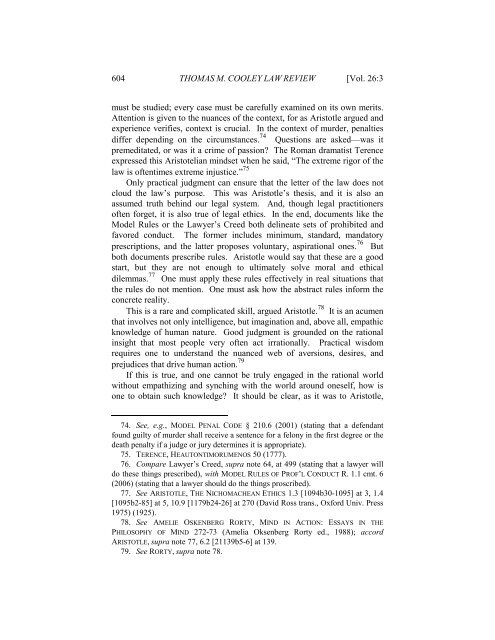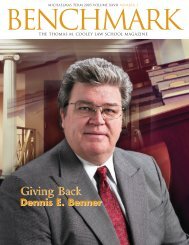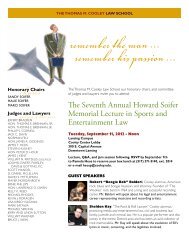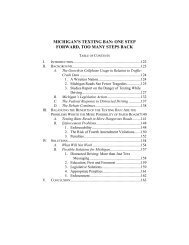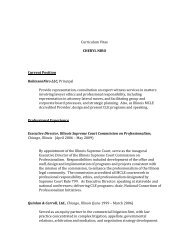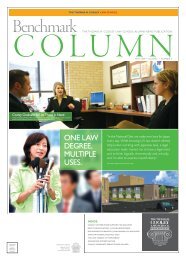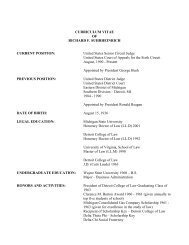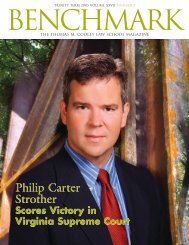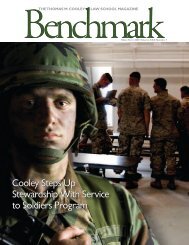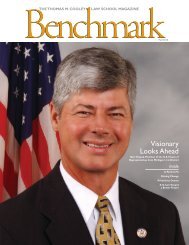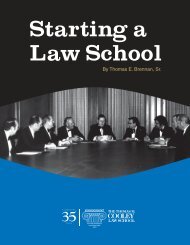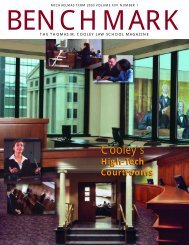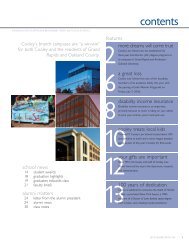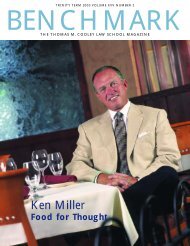Beyond The Model Rules - Thomas M. Cooley Law School
Beyond The Model Rules - Thomas M. Cooley Law School
Beyond The Model Rules - Thomas M. Cooley Law School
You also want an ePaper? Increase the reach of your titles
YUMPU automatically turns print PDFs into web optimized ePapers that Google loves.
604 THOMAS M. COOLEY LAW REVIEW [Vol. 26:3must be studied; every case must be carefully examined on its own merits.Attention is given to the nuances of the context, for as Aristotle argued andexperience verifies, context is crucial. In the context of murder, penaltiesdiffer depending on the circumstances. 74 Questions are asked—was itpremeditated, or was it a crime of passion? <strong>The</strong> Roman dramatist Terenceexpressed this Aristotelian mindset when he said, “<strong>The</strong> extreme rigor of thelaw is oftentimes extreme injustice.” 75Only practical judgment can ensure that the letter of the law does notcloud the law’s purpose. This was Aristotle’s thesis, and it is also anassumed truth behind our legal system. And, though legal practitionersoften forget, it is also true of legal ethics. In the end, documents like the<strong>Model</strong> <strong>Rules</strong> or the <strong>Law</strong>yer’s Creed both delineate sets of prohibited andfavored conduct. <strong>The</strong> former includes minimum, standard, mandatoryprescriptions, and the latter proposes voluntary, aspirational ones. 76 Butboth documents prescribe rules. Aristotle would say that these are a goodstart, but they are not enough to ultimately solve moral and ethicaldilemmas. 77 One must apply these rules effectively in real situations thatthe rules do not mention. One must ask how the abstract rules inform theconcrete reality.This is a rare and complicated skill, argued Aristotle. 78 It is an acumenthat involves not only intelligence, but imagination and, above all, empathicknowledge of human nature. Good judgment is grounded on the rationalinsight that most people very often act irrationally. Practical wisdomrequires one to understand the nuanced web of aversions, desires, andprejudices that drive human action. 79If this is true, and one cannot be truly engaged in the rational worldwithout empathizing and synching with the world around oneself, how isone to obtain such knowledge? It should be clear, as it was to Aristotle,74. See, e.g., MODEL PENAL CODE § 210.6 (2001) (stating that a defendantfound guilty of murder shall receive a sentence for a felony in the first degree or thedeath penalty if a judge or jury determines it is appropriate).75. TERENCE, HEAUTONTIMORUMENOS 50 (1777).76. Compare <strong>Law</strong>yer’s Creed, supra note 64, at 499 (stating that a lawyer willdo these things prescribed), with MODEL RULES OF PROF’L CONDUCT R. 1.1 cmt. 6(2006) (stating that a lawyer should do the things proscribed).77. See ARISTOTLE, THE NICHOMACHEAN ETHICS 1.3 [1094b30-1095] at 3, 1.4[1095b2-85] at 5, 10.9 [1179b24-26] at 270 (David Ross trans., Oxford Univ. Press1975) (1925).78. See AMELIE OSKENBERG RORTY, MIND IN ACTION: ESSAYS IN THEPHILOSOPHY OF MIND 272-73 (Amelia Oksenberg Rorty ed., 1988); accordARISTOTLE, supra note 77, 6.2 [21139b5-6] at 139.79. See RORTY, supra note 78.


